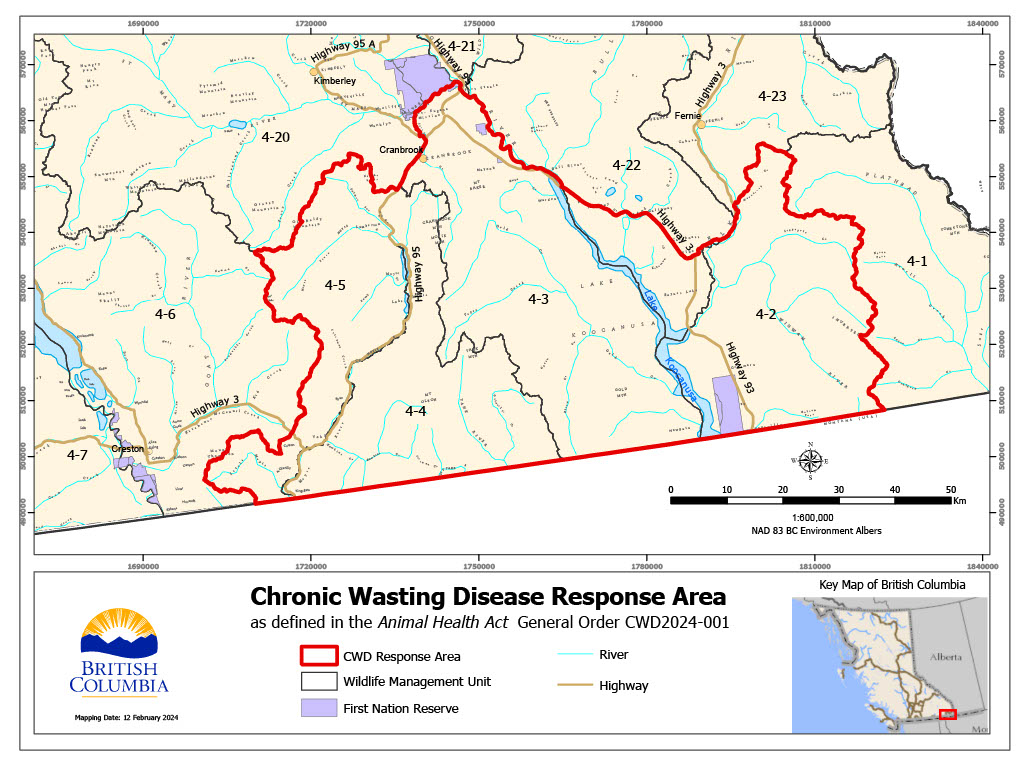The first two positive cases of Chronic Wasting Disease have been detected in British Columbia. The B.C. Wildlife Federation has been engaged on this file for many years, and will continue to respond to the situation as it develops.
“At this stage, we’re all in this together. As an active member of the CWD Committee and Regional Working Groups the BCWF will continue to support our provincial staff who have worked tirelessly on this file without the financial or political support required to combat this,” says Jesse Zeman, BCWF Executive Director.
UPDATE:
The Province has implemented mandatory chronic-wasting disease testing, as well as restrictions on the transport and disposal of any road-killed cervids (deer, moose, elk, caribou) in the area where the first cases of the disease were found in B.C. in two deer samples in January 2024.
The restrictions apply within the Initial Response Area, defined as Management Units 4-2, 4-3, 4-4, 4-5, and a portion of 4-22. This is south of and including Highway 3, which is situated between south of Cranbrook toward the United States border, west to the Moyie Range, and east to the Macdonald Range.

Cait Nelson, a Wildlife Health Biologist with the BC Ministry of Water, Land and Resource Stewardship, has requested that we share the following messaging:
Message regarding human health risk:
- There is no direct evidence that CWD can be transmitted to humans and there have been no reports of the disease in humans. However, to prevent potential risk of transmission or illness, it is recommended that people do not eat meat or other parts of an animal infected with CWD. Cooking temperatures are not able to destroy the abnormal protein or prion that causes CWD.
Message to trappers:
- Trappers collecting road killed cervids within the affected areas of the Kootenay Region are asked to submit samples for CWD testing and to keep carcasses in secure leak-proof storage until a negative CWD result is confirmed before using carcasses for bait. This will be a legal requirement for trappers within the Initial Response Area and a recommendation for trappers in the surrounding area. For trappers in other parts of BC, we request submission of samples for CWD testing and tracking locations of carcasses placed at bait sites.
Message to hunters:
- Hunting is considered the most important tool in managing CWD. Evidence from wildlife management agencies elsewhere shows that targeted harvest can be effective in keeping infection rates low, if applied early in an outbreak. The recommendation from CWD experts is to remove animals that are most likely to be infected to reduce disease transmission. This can be achieved through harvest management and/or targeted removals. Enhanced surveillance and testing help to direct these efforts towards specific population units and geographic areas. Harvest management and other tools such as carcass transport restrictions, disposal requirements are being considered for the 2024 hunting season.
Thank you again for your continued support in this effort.
If you have any questions, please visit:
BC Wildlife Health Program – www.gov.bc.ca/wildlifehealth
BC CWD Program – www.gov.bc.ca/chronicwastingdisease
